- Home
- Terry Brooks
The Sword of Shannara Trilogy the Sword of Shannara Trilogy Page 4
The Sword of Shannara Trilogy the Sword of Shannara Trilogy Read online
Page 4
“The Druids were a very powerful force during those years and the plan of Galaphile seemed to be working as anticipated. But as time passed, it became apparent that some of the members of the Council had powers far surpassing those of the others, powers that had lain dormant and gathered strength in a few phenomenal, genius minds. It would be difficult to describe those powers to you without taking quite some time—more time than we have available to us. What is important for our purposes is to recognize that some among the Council who possessed the very greatest minds became convinced that they were destined to shape the future of the races. In the end, they broke from the Council to form their own group and for some time disappeared and were forgotten.
“About one hundred and fifty years later, there occurred a terrible civil war within the race of Man, which eventually widened into the First War of the Races, as the historians named it. Its cause was uncertain even then, and has now almost been forgotten. In simple terms, a small sector of the race of Man revolted against the teachings of the Council and formed a very powerful and highly trained army. The proclaimed purpose of the uprising was the subjugation of the rest of Man under a central rule for the betterment of the race and the furthering of its pride as a people. Eventually, almost all segments of the race rallied to the new cause and war was begun upon the other races, ostensibly to accomplish this new goal. The central figure behind the war was a man called Brona—an archaic Gnome term for ‘Master.’ It was said that he was the leader of the Druids of the first Council who had broken away and disappeared into the Northland. No reliable source ever reported seeing him or talking with him, and in the end it was concluded that Brona was merely a name, a fictitious character. The revolt, if you care to call it such, was finally crushed by the combined power of the Druids and the other allied races. Did you know of this, Shea?”
The Valeman nodded and smiled slightly.
“I have heard of the Druid Council, of its purposes and work—all ancient history since the Council died out long ago. I have heard of the First War of the Races, though not in the same way as you tell it. Prejudiced, I believe you would call my version. The war was a bitter lesson for Man.”
Allanon waited patiently and did not speak as Shea paused to reflect on his own knowledge of the past before continuing.
“I know that the survivors of our race fled south after the war was over and have remained there ever since, rebuilding again the homes and cities lost, trying to create life rather than destroy it. You seem to think of it as an isolation born of fear. But I believe it was and still is the best way to live. Central governments have always been the greatest danger to mankind. Now there are none—small communities are the new rule of life. Some things are better left alone by everyone.”
The tall man laughed, a deep mirthless chuckle that made Shea feel suddenly foolish.
“You know so little, though what you say is true enough. Truisms, my young friend, are the useless children of hindsight. Well, I don’t propose to argue with you now on the fine points of social reform, let alone political activism. That will have to wait until another time. Tell me what you know of the creature called Brona. Perhaps … no, wait a moment. Someone is coming.”
The words were scarcely out of his mouth before the stocky figure of Flick appeared around the corner of the inn. The Valeman stopped abruptly as he saw Allanon and hesitated until Shea waved to him. He came over slowly and remained standing, his eyes on the dark face as the big man smiled slowly down at him, the familiar enigmatic twist at the corners of his mouth.
“I was just wondering where you had gone,” Flick began, speaking to his brother, “and didn’t mean to interrupt …”
“You are not interrupting anything,” Shea replied quickly. But Allanon seemed to disagree.
“This conversation was for your ears alone,” he declared flatly. “If your brother chooses to stay, he will have decided his own fate in the days to come. I would strongly suggest that he not remain to hear the rest of our discussion, but forget that we ever talked. Still, it is his own choice.”
The brothers looked at each other, unable to believe that the tall man was serious. But his grim face indicated that he was not joking, and for a moment both men hesitated, reluctant to say anything. Finally Flick spoke.
“I have no idea what you’re talking about, but Shea and I are brothers and what happens to one must happen to both. If he’s in any trouble, I should share it with him—it’s my own choice, I’m sure.”
Shea stared at him in amazement. He had never heard Flick sound more positive about anything in his entire life. He felt proud of his brother and smiled up at him gratefully. Flick winked back quickly and sat down, not looking at Allanon. The tall traveler stroked his small, dark beard with a lean hand and smiled quite unexpectedly.
“Indeed, the choice is your own, and you have proven yourself a brother by your words. But it is deeds that make the difference. You may regret the choice in the days to come.…”
He trailed off, lost in thought as he studied the bowed head of Flick for several long moments before turning to Shea.
“Well, I cannot begin my story again just for your brother. He will have to follow as best he can. Now tell me what you know of Brona.”
Shea thought silently for a few minutes and then shrugged.
“I really don’t know much of anything about him. He was a myth, as you said, the fictional leader of the uprising in the First War of the Races. He was supposed to have been a Druid who left the Council and used his own evil power to master the minds of his followers. Historically, he was never seen, never captured, or killed in the final battle. He never existed.”
“Historically accurate, I’m sure,” muttered Allanon. “What do you know of him in connection with the Second War of the Races?”
Shea smiled briefly at the question.
“Well, legend has it that he was the central force behind that war also, but it turned out to be just another myth. He was supposed to be the same creature who had organized the armies of Man in the first war, except in this one he was called the Warlock Lord—the evil counterpart to the Druid Bremen. I believe Bremen was supposed to have killed him in the second war, however. But all that was only fantasy.”
Flick hastened to nod his agreement, but Allanon said nothing. Shea waited for some form of confirmation, openly amused by the whole subject.
“Where is all this talk taking us anyway?” he asked after a moment.
Allanon glanced down at him sharply, cocking one dark eyebrow in wonder.
“Your patience is remarkably limited, Shea. After all, we have just covered in a matter of minutes the history of a thousand years. However, if you think you can restrain yourself for a few moments longer, I believe I can promise you that your question will be answered.”
Shea nodded, feeling no little mortification at the reprimand. It was not the words themselves that hurt; it was the way Allanon said them—with that mocking smile and ill-concealed sarcasm. The Valeman regained his composure quickly, though, and shrugged his willingness to allow the historian to continue at his own pace.
“Very well,” the other acknowledged. “I shall try to complete our discussion quickly. What we have spoken of up to this point has been background history to what I will tell you now—the reason why I came to find you. I recall to your memory the events of the Second War of the Races—the most recent war in the new history of Man, fought less than five hundred years ago in the Northland. Man had no part in this war; Man was the defeated race of the first, living deep in the heart of the Southland, a few small communities trying hard to survive the threat of total extinction. This was a war of the great races—the Elven people and the Dwarfs fighting against the power of the savage Rock Trolls and the cunning Gnomes.
“After the completion of the First War of the Races, the known world partitioned into the existing four lands, and the races were at peace for quite a long time. During this period, the power and influence of the Druid
Council diminished greatly as the apparent need for its assistance seemed to have ceased. It is only fair to add that the Druids had grown lax in their attention to the races, and over a period of years the new members lost sight of the Council’s purposes and turned away from the peoples’ problems to more personal concerns, leading a more isolated existence of study and meditation. The Elven people were the most powerful race, but confined themselves to their isolated homeland deep in the west where they were content to remain in relative isolation—a mistake they were to regret deeply. The other peoples scattered and developed into smaller, less unified societies, primarily in the Eastland, though some groups did settle in parts of the Westland and Northland in the border countries.
“The Second War of the Races began when a huge army of Trolls came down out of the Charnal Mountains and seized all of the Northland, including the Druid fortress at Paranor. The Druids had been betrayed from within by several of their own people who had been won over by promises and offers from the enemy commander, who at this time was unknown. The remaining Druids, except for a very few who escaped or were away, were captured and thrown into the dungeons of the Keep and never seen again. Those who had escaped the fate of their brothers scattered about the four lands and went into hiding. The Troll army immediately moved against the Dwarf people in the Eastland with the obvious intent of crushing all resistance as quickly as possible. But the Dwarfs gathered deep within the huge forests of the Anar, which only they know well enough to survive in for any length of time, and there held firm against the advances of the Troll armies despite the aid being given by a few of the Gnome tribes who had joined the invasion force. The Dwarf King, Raybur, recorded in his own peoples’ history whom he had discovered the real enemy to be—the rebel Druid, Brona.”
“How could the Dwarf King believe this?” Shea interjected quickly. “If it were true, the Warlock Lord would be over five hundred years old! At any rate, I should think that some ambitious mystic must have suggested the idea to the king with the thought of reviving an old, outdated myth—perhaps to better his own position in the court or something.”
“That is a possibility,” Allanon conceded. “But let me continue the story. After long months of fighting, the Trolls were evidently led to believe that the Dwarfs had been beaten, so they turned their war legions to the west and began to march against the powerful Elven kingdom. But during the months the Trolls had battled the Dwarf people, the few Druids who had escaped from Paranor had been assembled by the famous mystic Bremen, an old and highly esteemed elder of the Council. He led them to the Elven kingdom in the Westland to warn the people there of this new threat and to prepare for the almost certain invasion of the Northlanders. The Elven King in that year was Jerle Shannara—the greatest of all the Elven kings, perhaps, with the exception of Eventine. Bremen warned the King of the probable assault on his lands, and the Elven ruler quickly prepared his armies before the advancing Troll hordes had reached their borders. I’m sure that you know your history well enough to remember what happened when the battle was fought, Shea, but I want you to pay attention to the particulars of what I tell you next.”
Both Shea and an excited Flick nodded.
“The Druid Bremen gave to Jerle Shannara a special sword for the battle against the Trolls. Whoever held the sword was supposed to be invincible—even against the awesome power of the Warlock Lord. When the Troll legions entered the Valley of Rhenn in the borderlands of the Elven kingdom, they were attacked and trapped by the armies of the Elven people fighting from higher ground and were badly beaten in a two-day, pitched battle. The Elves were led by the Druids and Jerle Shannara, who carried the great sword given him by Bremen. They fought together against the Troll armies, who were said to have had the added might of beings from the spirit world under the domination of the Warlock Lord. But the courage of the Elven King and the power of the fabulous sword overwhelmed the spirit creatures and destroyed them. When the remainder of the Troll army attempted to escape back to the safety of the Northland across the Plains of Streleheim, it was caught between the pursuing army of Elves and an army of Dwarfs approaching from the Eastland. There was a terrible battle fought in which the Troll army was destroyed almost to the last man. During the battle, Bremen disappeared while in combat at the side of the Elven King, facing the Warlock Lord himself. It was recorded that both Druid and Warlock were lost in the fighting and neither was ever seen again. Not even the bodies were found.
“Jerle Shannara carried the famous sword given him until his death some years later. His son gave the weapon to the Druid Council at Paranor, where the blade was set in a huge block of Tre-Stone and placed in a vault in the Druid’s Keep. I’m sure you are quite familiar with the legend of the sword and what it stands for, what it means to all the races. The great sword rests today at Paranor just as it has for five hundred years. Have I been sufficiently lucid in my narration, Valemen?”
Flick nodded in dumbfounded wonder, still caught up in the excitement of the history. But Shea suddenly decided that he had heard enough. Nothing that Allanon had told them of the history of the races was fact—not if he was to believe what he had been taught by his own people since he was a child. The big man had simply related to them a childhood fantasy that had been passed down through the ages from parents to small children. He had listened patiently to everything Allanon had falsely represented to be the truth about the races, humoring him out of respect for his reputation. But the entire tale of the sword was ridiculous, and Shea was through being played for a fool.
“What has all this got to do with your coming to Shady Vale?” he persisted, a faint smile betraying his disgust. “We’ve heard all about a battle that took place some five hundred years ago—a battle that did not even concern Man, but Trolls and Elves and Dwarfs and goodness knows what else, as you tell it. Did you say there were spirits or something? I’m sorry if I sound incredulous, but I find this whole tale a little hard to swallow. The story of the Sword of Jerle Shannara is well known to all the races, but it’s only fiction, not fact—a glorified story of heroism created to stir up a sense of loyalty and duty in the races that have a part in its history. But the legend of Shannara is a tale for children that adults must outgrow as they accept the responsibilities of manhood. Why did you waste time relating this fairy tale when all I want is a simple answer to a simple question? Why are you looking for … me?”
Shea stopped short as he saw Allanon’s dark features tighten and grow black with anger, the great brows knitting over sudden pinpoints of light in the deep shadows that hid the eyes. The tall man seemed to be fighting to contain some terrible fury within, and for a moment it appeared to Shea that he was about to be strangled by the huge hands that locked before his face as the man glared in open rage. Flick moved back hastily and tripped over his own feet in the process, fear welling up inside.
“Fool … you fool,” rasped the giant in barely controlled fury. “You know so little … children! What does the race of Man know of truth—where has Man been but hiding, creeping in terror under piteous shelters in the deepest regions of the Southland like frightened rabbits? You dare to tell me that I speak of fairy tales—you, who have never known strife, safe here in your precious Vale! I came to find the bloodline of kings, but I have found a little boy who hides himself in falsehoods. You are nothing but a child!”
Flick was fervently wishing he could sink into the ground beneath his feet or perhaps simply vanish, when to his utter astonishment he saw Shea leap to his feet before the tall man, his lean features flushed in fury and his hands knotted into fists as he braced himself. The Valeman was so overcome with anger that he could not speak, and stood before his accuser, shaking with rage and humiliation. But Allanon was not impressed and his deep voice sounded again.
“Hold, Shea. Do not be a greater fool! Pay attention to what I tell you now. All that I told you has come down through the ages as legend and was so told to the race of Man. But the time for fairy tales is ended. What I have to
ld you is not legend; it is the truth. The sword is real; it rests today at Paranor. But most important of all, the Warlock Lord is real. He lives today and the Skull Kingdom is his domain!”
Shea started, suddenly realizing that the man was not deliberately lying after all—that he did not believe this to be a fairy tale. He relaxed and sat down slowly, his gaze still riveted on the dark face. Abruptly he recalled the historian’s words.
“You said king … you were looking for a king …?”
“What is the legend of the Sword of Shannara, Shea? What does the inscription carved into the block of Tre-Stone read?”
Shea was dumbfounded, unable to recall any legend at all.
“I don’t know … I can’t remember what it said. Something about the next time …”
“A son!” spoke up Flick suddenly from the other side. “When the Warlock Lord appeared again in the Northland, a son of the House of Shannara would come forth to take up the Sword against him. That was the legend!”
Shea looked over at his brother, remembering then what the inscription was supposed to read. He looked back at Allanon, who was watching him intently.
“How does this concern me?” he asked quickly. “I’m not a son of the House of Shannara—I’m not even Elven. I’m a half-blood, not an Elf, not a king. Eventine is the heir to the House of Shannara. Are you telling me that I’m a lost son—a missing heir? I don’t believe it!”
He looked quickly to Flick for support, but his brother appeared to be completely lost, staring in bewilderment at the face of Allanon. The dark man spoke quietly.
“You do have Elven blood in you, Shea, and you are not the true son of Curzad Ohmsford. That you must know. And Eventine is not directly of the blood of Shannara.”
“I have always known that I was an adopted son,” the Valeman admitted, “but surely I could not have come from … Flick, tell him!”

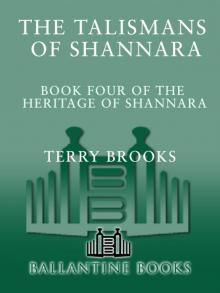 The Talismans of Shannara
The Talismans of Shannara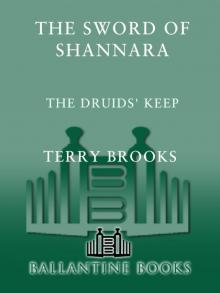 The Sword of Shannara: The Druids' Keep: The Druids' Keep
The Sword of Shannara: The Druids' Keep: The Druids' Keep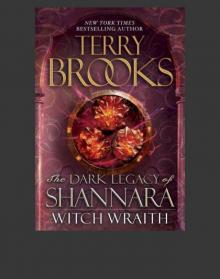 Witch Wraith
Witch Wraith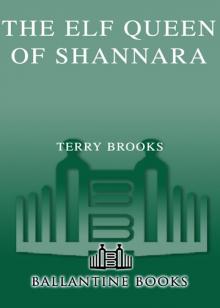 The Elf Queen of Shannara
The Elf Queen of Shannara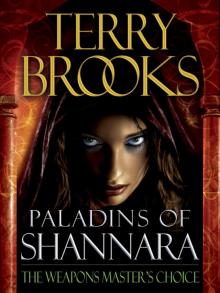 The Weapons Master's Choice
The Weapons Master's Choice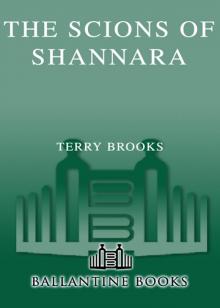 The Scions of Shannara
The Scions of Shannara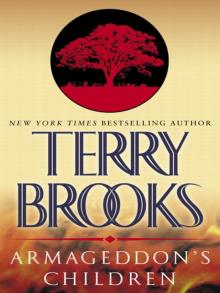 Armageddon's Children
Armageddon's Children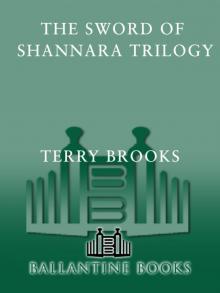 The Sword of Shannara Trilogy the Sword of Shannara Trilogy
The Sword of Shannara Trilogy the Sword of Shannara Trilogy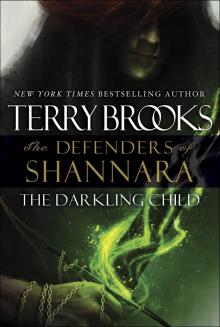 The Darkling Child
The Darkling Child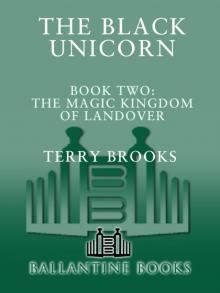 The Black Unicorn
The Black Unicorn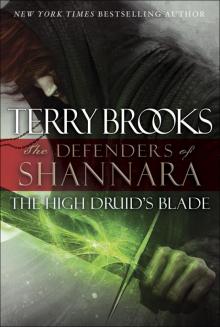 The High Druid's Blade
The High Druid's Blade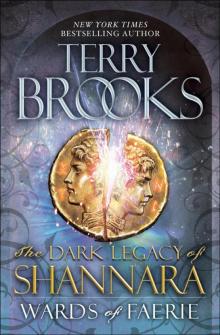 Wards of Faerie
Wards of Faerie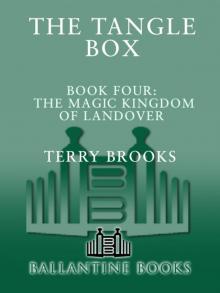 The Tangle Box
The Tangle Box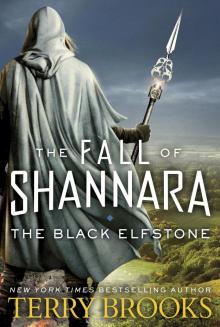 The Black Elfstone
The Black Elfstone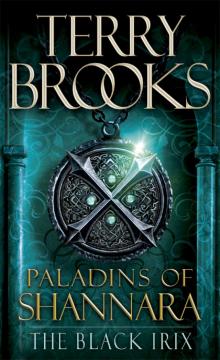 The Black Irix
The Black Irix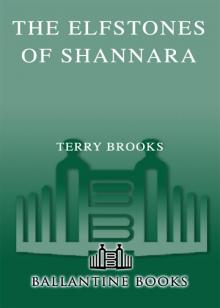 The Elfstones of Shannara
The Elfstones of Shannara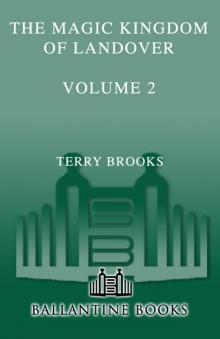 The Magic Kingdom of Landover Volume 2
The Magic Kingdom of Landover Volume 2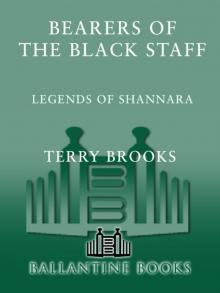 Bearers of the Black Staff
Bearers of the Black Staff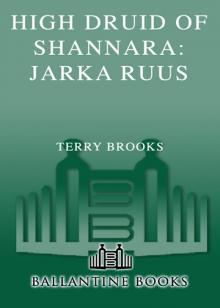 Jarka Ruus
Jarka Ruus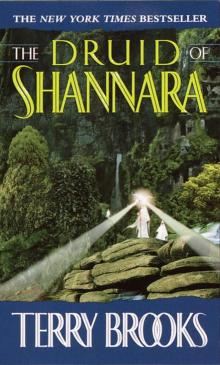 The Druid of Shannara
The Druid of Shannara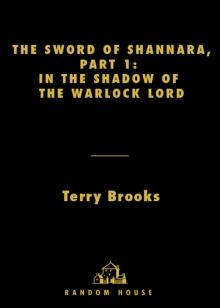 The Sword of Shannara
The Sword of Shannara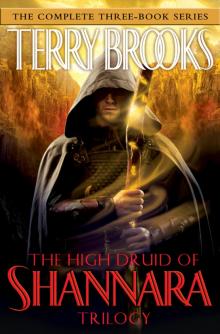 The High Druid of Shannara Trilogy
The High Druid of Shannara Trilogy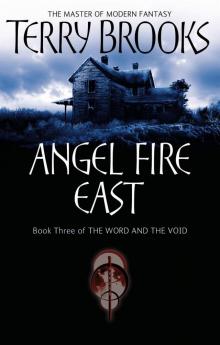 Angel Fire East
Angel Fire East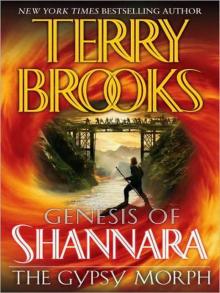 The Gypsy Morph
The Gypsy Morph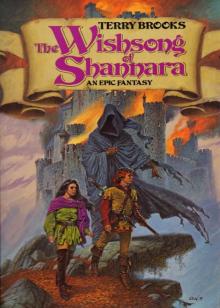 The Wishsong of Shannara
The Wishsong of Shannara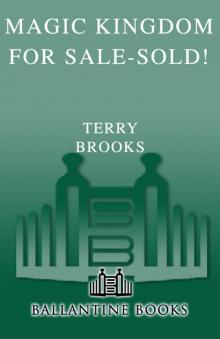 Magic Kingdom for Sale--Sold
Magic Kingdom for Sale--Sold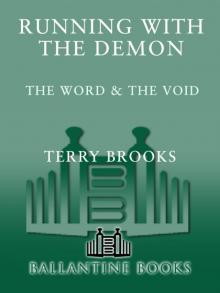 Running With the Demon
Running With the Demon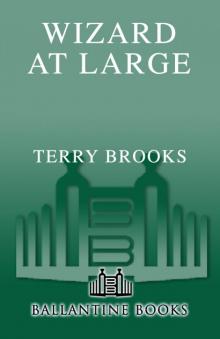 Wizard at Large
Wizard at Large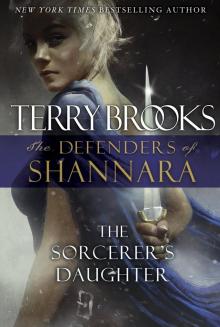 The Sorcerer's Daughter
The Sorcerer's Daughter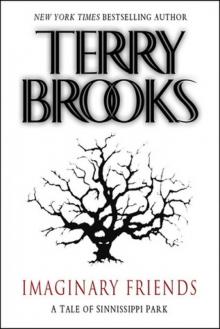 Imaginary Friends
Imaginary Friends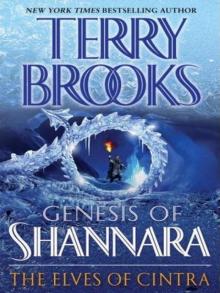 The Elves of Cintra
The Elves of Cintra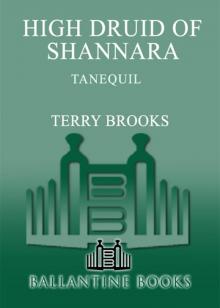 Tanequil
Tanequil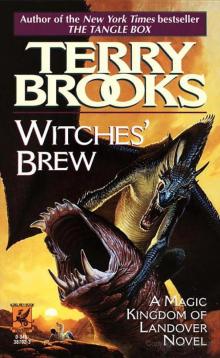 Witches' Brew
Witches' Brew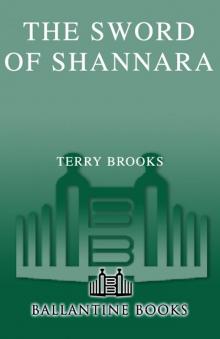 The Sword of the Shannara and the Elfstones of Shannara
The Sword of the Shannara and the Elfstones of Shannara The World of Shannara
The World of Shannara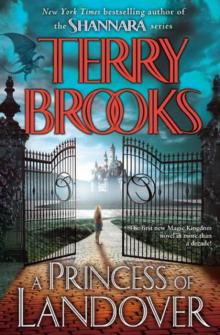 A Princess of Landover
A Princess of Landover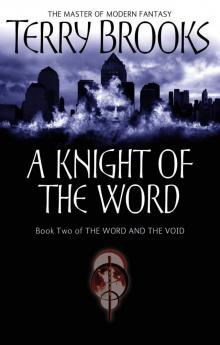 A Knight of the Word
A Knight of the Word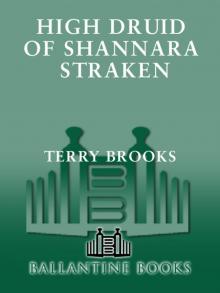 Straken
Straken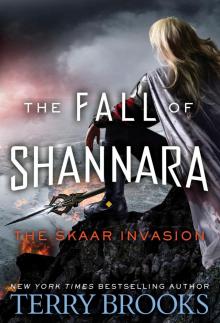 The Skaar Invasion
The Skaar Invasion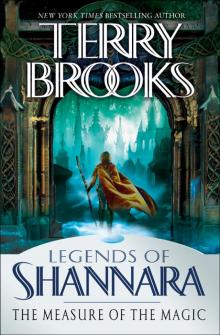 The Measure of the Magic: Legends of Shannara
The Measure of the Magic: Legends of Shannara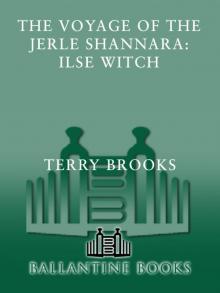 Ilse Witch
Ilse Witch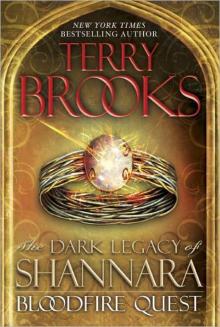 Bloodfire Quest
Bloodfire Quest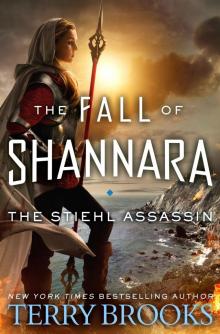 The Stiehl Assassin
The Stiehl Assassin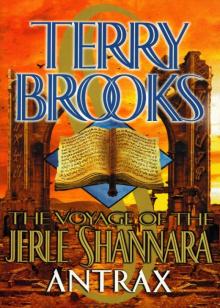 Antrax
Antrax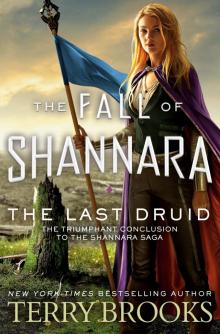 The Last Druid
The Last Druid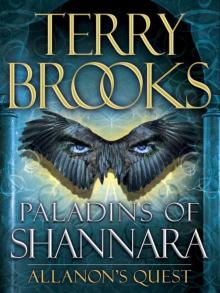 Paladins of Shannara: Allanon's Quest
Paladins of Shannara: Allanon's Quest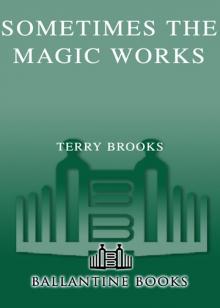 Sometimes the Magic Works: Lessons From a Writing Life
Sometimes the Magic Works: Lessons From a Writing Life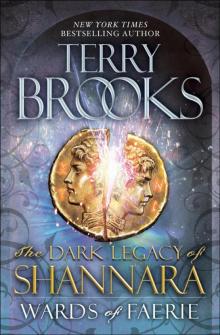 Wards of Faerie: The Dark Legacy of Shannara
Wards of Faerie: The Dark Legacy of Shannara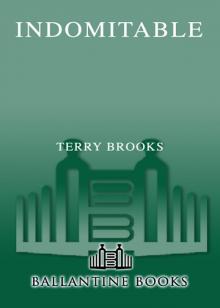 Indomitable: The Epilogue to The Wishsong of Shannara
Indomitable: The Epilogue to The Wishsong of Shannara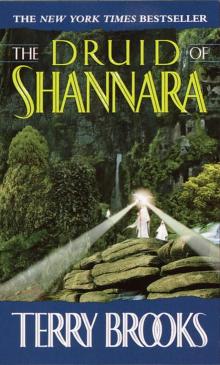 Heritage of Shannara 01 - The Druid of Shannara
Heritage of Shannara 01 - The Druid of Shannara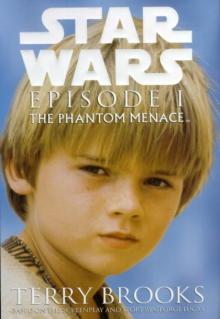 Star Wars - Phantom Menace
Star Wars - Phantom Menace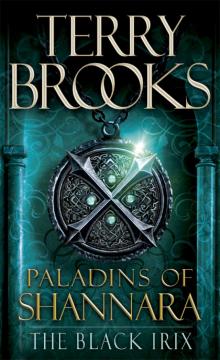 The Dark Legacy of Shannara Trilogy 3-Book Bundle
The Dark Legacy of Shannara Trilogy 3-Book Bundle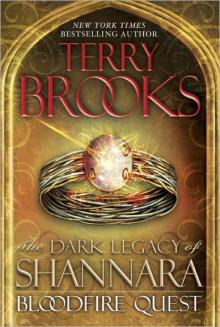 The Bloodfire Quest
The Bloodfire Quest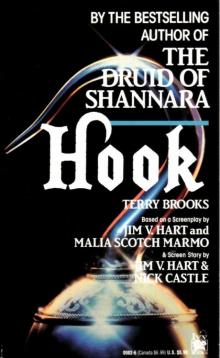 The Hook (1991)
The Hook (1991)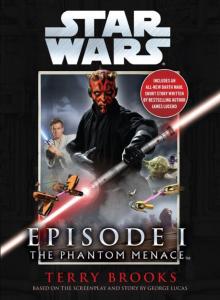 Star Wars: Episode I: The Phantom Menace
Star Wars: Episode I: The Phantom Menace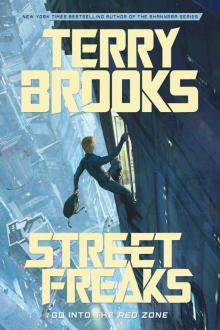 Street Freaks
Street Freaks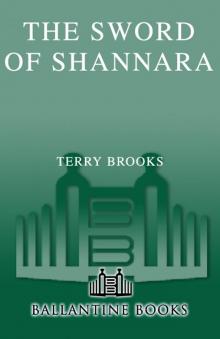 The Sword of Shannara & Elfstones of Shannara
The Sword of Shannara & Elfstones of Shannara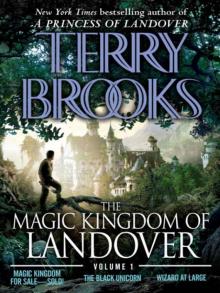 The Magic Kingdom of Landover , Volume 1
The Magic Kingdom of Landover , Volume 1 The Phantom Menace
The Phantom Menace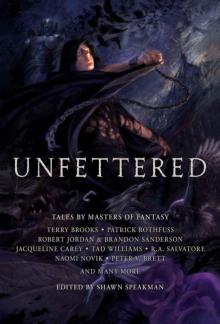 Unfettered
Unfettered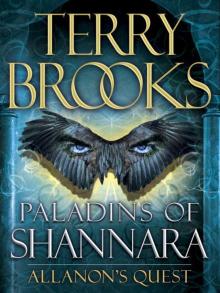 Allanon's Quest
Allanon's Quest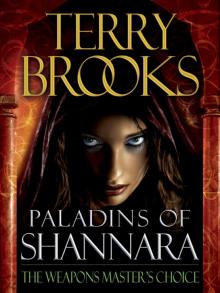 Paladins of Shannara: The Weapons Master's Choice
Paladins of Shannara: The Weapons Master's Choice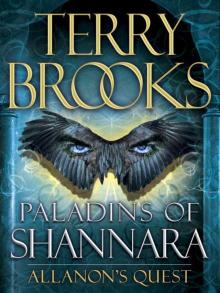 Terry Brooks - Paladins of Shannara - Allanon's Quest (Short Story)
Terry Brooks - Paladins of Shannara - Allanon's Quest (Short Story)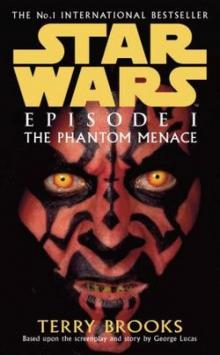 Star Wars Episode I: The Phantom Menace (star wars)
Star Wars Episode I: The Phantom Menace (star wars)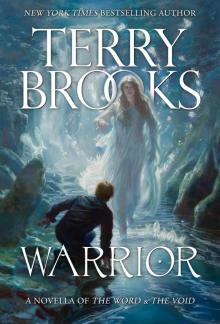 Warrior (The Word and the Void)
Warrior (The Word and the Void)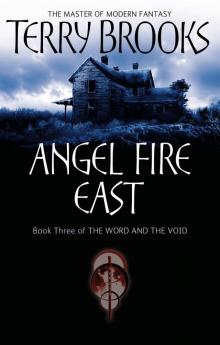 Word & Void 03 - Angel Fire East
Word & Void 03 - Angel Fire East![[Magic Kingdom of Landover 05] - Witches' Brew Read online](http://i1.bookreadfree.com/i2/04/05/magic_kingdom_of_landover_05_-_witches_brew_preview.jpg) [Magic Kingdom of Landover 05] - Witches' Brew
[Magic Kingdom of Landover 05] - Witches' Brew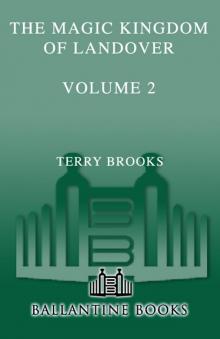 The Magic Kingdom of Landover - Volume 2
The Magic Kingdom of Landover - Volume 2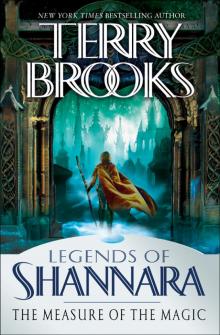 The Measure of the Magic
The Measure of the Magic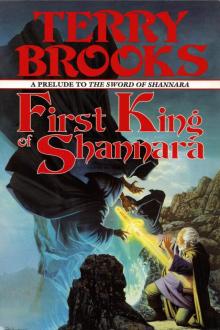 The First King of Shannara
The First King of Shannara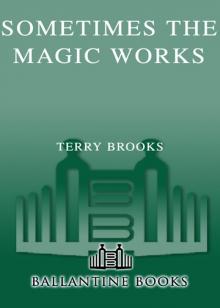 Sometimes the Magic Works
Sometimes the Magic Works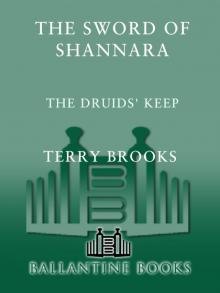 The Sword of Shannara, Part 2: The Druids' Keep
The Sword of Shannara, Part 2: The Druids' Keep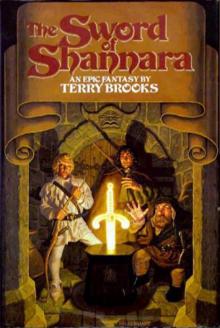 The Sword of Shannara tost-1
The Sword of Shannara tost-1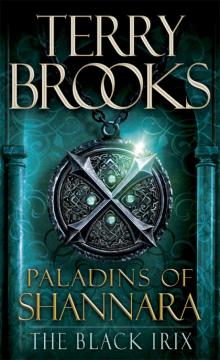 Paladins of Shannara: The Black Irix (Short Story)
Paladins of Shannara: The Black Irix (Short Story)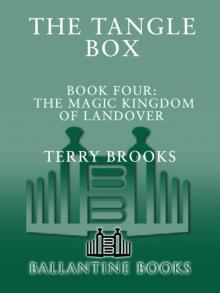 Tangle Box
Tangle Box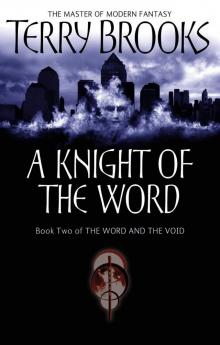 Word & Void 02 - A Knight of the Word
Word & Void 02 - A Knight of the Word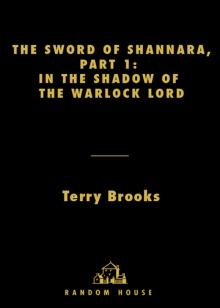 The Sword of Shannara, Part 1: In the Shadow of the Warlock Lord
The Sword of Shannara, Part 1: In the Shadow of the Warlock Lord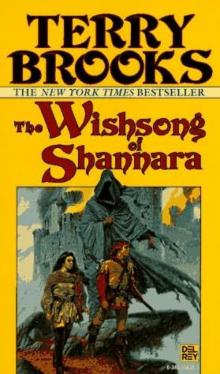 The Wishsong of Shannara tost-3
The Wishsong of Shannara tost-3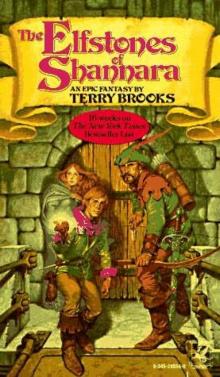 The Elfstones of Shannara tost-2
The Elfstones of Shannara tost-2